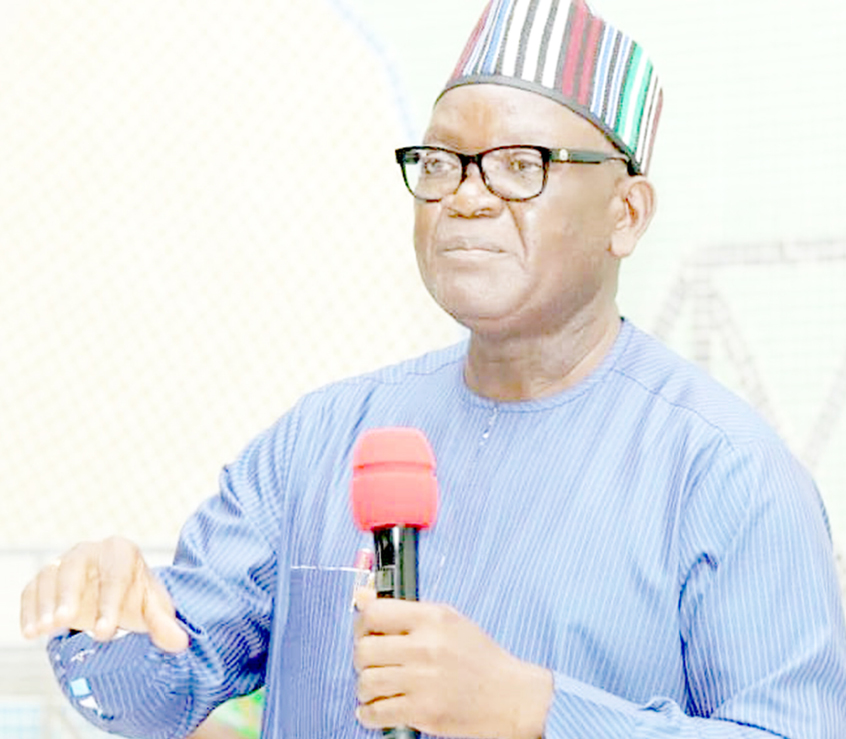Governor Samuel Ortom’s eight-year administration began in 2015 with many mouth-watering promises to the excitement of people of Benue State. But with barely 2 days to the end his tenure, at least five of those promises are yet to be fulfilled. They include revival of moribund industries; remodeling of the state-owned newspapers, establishment of a civil airport, prompt payment of salaries and pensions and creating gainful opportunity for the youth.
Although the administration made appreciable advancement in the educational sector by restoring the lost glory of the state-owned schools of nursing and midwifery, building of legacy palaces for two paramount traditional rulers of Tiv and Idoma kingdoms, construction of a befitting secretariat for the Christian Association of Nigeria (CAN), construction of some roads and provision of electricity, among others, he could not achieve the five promises that would have had direct bearing in the lives of the people.
He had promised to make the issue of unpaid salaries a thing of the past at different fora during his campaigns eight years ago.
During a church service in Otukpo, the governor was visibly angry at the plight of workers, who were then owed four months by the then Governor Gabriel Suswam administration. He was moved to tears when he addressed the congregation over the issue of delay in the payment of salaries and other welfare packages.
- Police arrest 26 suspected kidnappers, rescue victims
- Abiodun dissolves cabinet, gives appointees ‘parting gifts’
Today, Ortom would be leaving the stage with at least 14 months of unpaid salaries.
The state chairman of the Nigeria Union of Teachers’ (NUT), Levi Terna Akuma, told our correspondent in Makurdi that the state government presently owed teachers 10 months salaries.
Akuma added, “The backlogs are there. December of 2022 is not yet paid, as 9 local governments are awaiting; then the two arrears because it is not every teacher that is in those months. So I believe it will be a total of 14 months of unpaid salaries.”
On his part, the state chairman of the Nigeria Labour Congress (NLC), Terungwa Igbe said, “At the state level, workers are owed eight months while at the local government level, they owe 10 months and teachers 11 months respectively.
“The administration is going, so we are waiting for a new administration to come and pay.”
The chairman of the Concerned/Aggrieved Pensioners in Benue State, Comrade Akosu Ioream, also said that pensioners were being owed between 39 and 79 months arrears at the state and local government level respectively, with the backlog of gratuity now a forgotten issue.
It would be recalled that Governor Ortom had pleaded with pensioners in the state severally to be patient with his administration as it sought measures to offset their arrears. One of such measures was that the state government had domesticated the PENCOM law to enable it pay the arrears of pensions in the state as soon as the required terms were met.
The governor said a reasonable amount was already in the account of PENCOM and when it reached a threshold, the state government would be able to clear all the outstanding pension. He argued that the situation of workers was not his fault, saying, “It is not my making. Everyone should know that I inherited over N70billion salary arrears, pension and gratuity. Salary has been a problem right from the Aper Aku days.”
The governor had as part of his last minute effort to settle outstanding salary arrears before going into the 2023 polls, sought for approval and got a nod from the state House of Assembly for a N42 billion loan, which was intended to offset backlog of salaries before it claimed the federal government thwarted the effort.
Few days ago, his commissioner for information, Mike Inalegwu, blamed the federal government for the administration’s inability to clear what they owed, while he revealed that the state government had been able to save N6bn in the account of the PENCOM, which the incoming administration would access to clear pension arrears.
Inalegwu said, “For civil servants’ salaries, we applied, just like other states, for a N42bn bailout, which was approved for us. The money was ready for us to access but the All Progressives Congress (APC) hierarchy in the state went to the presidency not to release the money for Ortom to clear salaries and arrears, on the ground that they would not have anything to campaign against us so as to take over from us. The money is there, so let them go and take it. It is in the Central Bank, not with the government again. So, who has worked against the interest of the workers? They are the ones.”
Secondly, Ortom stirred the hornet’s nest when his administration attempted to build a cargo airport through a private-public partnership, which didn’t see the light of the day after all.
The governor’s critics have always used the failed airport project to lampoon the administration.
Although the proposed airport, expected to be located along the Makurdi-Lafia highway, could not be done for several reasons, including the threat by the host community to invoke snakes on workers sent to the site, the government recently proposed a new civil airport, which it expects the incoming administration to bring to life.
He further promised to revive ailing industries and establish new ones. After all said, not even one of the moribund industries Ortom visited during the buildup to the 2015 electioneering and his early days in office came alive in his eight years on the saddle of leadership.
The outgoing administration later explained that equipment at the Otukpo burnt bricks were obsolete, thereby adducing reasons for listing it among other 24 moribund industries for sale to prospective buyers. The company has remained in comatose as the government exits.
The situation is the same with Taraku Oil Mills, which in the past had in its employ, a total of over 600 workers, out of which 377 were laid off during mass retrenchment in 2009, while it ended production in 2013. The mill, as learnt, was originally intended to produce vegetable and groundnut oil, maize flour, cake, maize grit, livestock feeds, concentrate and diet mix, among other things, such as the golden soya, royal corn oil, sunflower oil, Benolina, Benofeeds, soya meals and Benogrits.
The Taraku, mill established in 1982 with a registered capital of $100million, was originally intended to add value to agricultural production in the agrarian state.
In 2021, state Commissioner for Industries and Cooperatives, Merga Kachina, a lawyer, told our correspondent in Makurdi that the mill was not functional.
It would be recalled that Governor Ortom had at the inception of his administration in 2015 expressed determination to “cast out evil spell hovering over the state-owned multiple industries” assuring that his administration would do anything possible to revive the moribund companies.
The governor, who made the promise when he visited Taraku Oil Mills, Otukpo Burnt Bricks and Ikwe Wildlife Park, had posited that the collapse of all industries in the state indicated that it was under an evil spell, considering the high level of economic decay and rot.
“This is my first time of coming into the oil mill, and from what we have seen, Benue is under a spell. There is no reason for this factory to be lying fallow It is a goldmine, greater than Benue Cement. The raw materials are here, and when the factory starts working, farmers, our mothers and the youth will smile,” he said during the visit.
However, none of the companies he said he would revamp is working as he prepares to exit power.
Ortom’s government also promised to resuscitate the state-owned newspaper, The Voice. He reiterated the promise in 2017 when the media organisation received some level of attention for repositioning. It was, however, abandoned.
The dilapidated structures that dotted the entire premises of the media house were restructured into modern facilities to meet the needs of staff and production equipment, but it remained uncompleted.
Since inception, The Voice had never undergone any renovation nor change on its machineries, which were earlier inherited from the then Benue/Plateau State in 1976 until when fortune almost smiled on the media house during the administration of Governor Gabriel Suswam in 2008. It that supplied BPPC materials worth N49million, cutting across plates, news prints, inks and stationeries and awarded a contract worth almost N200m to do a total renovation and construction of the main building that houses the press, editorial, commercial, new general manager’s office, marketing and production, as well as a contract to construct new administrative blocks for finance and administration.
The Suswam administration also acquired the digital web offset machine that would give full colour production, with the capacity of printing 23,000 copies per hour, now awaiting installation. The idea was to make sure that The Voice is put back in the newsstand on a daily basis and to circulate within the North Central states of Nigeria, Lagos and Abuja.
But the efforts could not see the light of the day until the assumption of duty of the incumbent Governor Ortom, who paid an on-the-spot assessment visit to the media house in his first few days in office and began to give it the needed attention after it re-awarded the contract to System Consultant and paid off the former contractor monies spent on the project so far when he threatened court action.
Our correspondent gathered that over N100m was released by the Ortom’s government for the reconstruction of the buildings expected to be completed before end of 2017 but that didn’t happen.
Ortom’s fifth unfulfilled promise was about bettering the lives of the youth through technology. The administration promised to establish the Benue Information Technology Development Agency (BITDA) and evaluate the designation and use of internet-enabled parks in the state capital and other places. This, according to the administration, would get the youth to consummate their businesses, advertise their wares and interact with their counterparts freely. These actions, in the thinking of the governor, would take many youths off the streets to be involved in more productive economic activities. But as the governor prepares to vacate office, this promise and others are yet to be fulfilled.

 Join Daily Trust WhatsApp Community For Quick Access To News and Happenings Around You.
Join Daily Trust WhatsApp Community For Quick Access To News and Happenings Around You.


